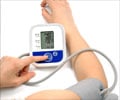Exaggerated advertising for a popular blood-pressure drug has has prompted Japan's health ministry to file a criminal complaint against the local arm of Swiss pharmaceutical giant Novartis.

Health Minister Norihisa Tamura has characterised as "extremely regrettable" the incident in which an employee of the world's number two drug maker hid his affiliation during a medical study into the effects of the drug used to lower blood pressure.
Under Japan's pharmaceutical law, anyone found guilty of exaggerated advertising can be punished with up to two years' prison or a fine of as much as two million yen ($19,400).
It would be the first time a criminal complaint has been filed in Japan over exaggerated pharmaceutical advertising, Kyodo said, quoting ministry officials.
A ministry panel of experts concluded in September that Novartis Pharma KK should be held responsible for studies at various universities that used manipulated data on the drug.
The studies suggested the drug -- sold under the name Diovan in Japan and licensed for use in more than 100 countries -- had some prophylactic effect on strokes and angina.
Advertisement
Novartis has maintained that the company had no knowledge of the wrongdoing, in which an ex-employee allegedly failed to disclose his affiliation with Novartis during various academic studies in which incomplete clinical data were used.
Advertisement
Novartis Pharmaceuticals chief David Epstein has apologised for concern the incident caused, but did not admit the company's role in the allegations.
Tokyo's Jikei University School of Medicine has retracted research that appeared in respected medical journal The Lancet six years ago due to data fabrication.
Kyoto Prefectural University of Medicine also concluded that its studies on the drug used incomplete clinical data.
Chiba University said in December it could not find intentional data fabrication but researchers failed to disclose 91 million yen ($880,000) in scholarship donations from the pharmaceutical company in the three years from 2007 to 2009.
Source-AFP















